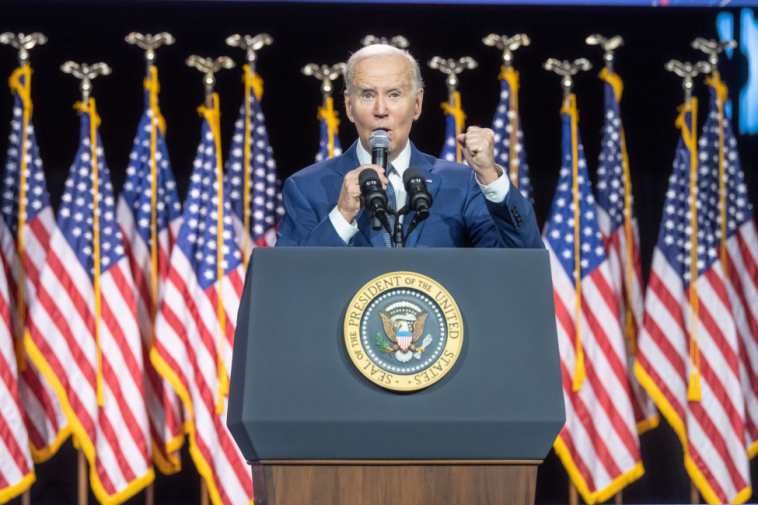Unsurprisingly, the majority of Americans perceive the U.S. economy as sinking fast, a view that many analysts believe could tilt the coming elections away from Kamala Harris. Despite claims of stabilizing inflation and descending interest rates, a Newsweek report from October 6 disclosed that 51 percent of the electorate feels the economy is spiraling downwards, with only a meager 30 percent showing optimism.
The disparity in economic sentiment is distinct when dissected according to voter predilection. An alarmingly high 79 percent of Republican-inclined voters project a gloomy picture, surging from 60 percent in September 2023, in stark contrast with the mere 23 percent of Democrat-leaning voters sharing the negative view. Public pessimism is transcending party barriers.
An unfortunate trend among Democrats demonstrates their state of affairs under the Biden-Harris leadership is no better. The percentage who reckon their financial position has improved over the past three years has plunged from 54 percent in September 2023 to a dismal 43 percent in October 2024. Republicans, in contrast, opine even more strongly they’re in worse shape now than in the past.
Back in July 2023, two-thirds of Trump supporters asserted their position was grimmer compared to the Trump era, a number that escalated to 76 percent in October under the Biden-Harris reign. In the words of Ronald Reagan during the 1980 presidential run against incumbent Jimmy Carter, ‘Are you better off than you were four years ago?’ These words could potentially spell doom for Harris in the upcoming polling.
Moreover, a significant portion of America harbors discontent with President Biden’s financial maneuvering. Roughly half, 47 percent, of the populace as of October believe that ‘Bidenomics’ has sent the economy plummeting, while merely 31 percent give credit to Biden’s economic strategies. Again, unsurprisingly, the 83 percent Trump enthusiasts share a pessimistic stance, as opposed to only 15 percent of Harris cheerleaders.
Despite alleged recent recovery, common Americans are yet to enjoy the fruits of economic betterment. Even as the economy shook off the coronavirus turmoil, seeing sudden leaps in global commodity prices and industry-specific cost bumps due to both pandemic-induced supply chain disturbances and a sweeping shift from service to goods demand, it’s evident that average Americans don’t find themselves in a better financial position.
Almost half, 47 percent of U.S. citizens confessed they were worse off in July 2023 compared to July 2020. In October 2024, over a year later, the figures didn’t improve, and 48 percent echoed the same sentiment. Even the percentage of those feeling a positive uptick stagnantly sits at 28, suggesting no real growth.
Economist Sam Kuhn explains that despite the sharp fall of inflation from its zenith in mid-2022, many Americans find themselves financially pressured as overall prices have shot up remarkably. The startling 21.7 percent increase in the Consumer Price Index (CPI) since the pandemic’s onset is clear evidence of this.
While wages have ostensibly remained in stride with inflation, the perpetual cost amplification in necessary commodities such as housing, food, and transportation pose authentic difficulty for adjustment. As inflation pacifies, these price augmentations whittle away at buying power, rendering it challenging for many to uphold their previous lifestyle.
Despite wages meeting or exceeding pre-pandemic levels, and amidst a seemingly energetic job market, Americans are struggling, unable to afford as they once could. Leading this dissatisfaction, Carleton College’s assistant professor of economics, Ethan Struby, offers the housing market as a concrete example.
High housing prices juxtaposed with elevated interest rates paint a frustrating picture. Despite higher earnings, many Americans find home ownership an unattainable dream, reflecting the true distress under the current Biden-Harris administration.
In summary, it is evident that the Biden-Harris strategy isn’t painting a rosy picture of the economy for most Americans. Declines in public sentiment, despite claims of economic recovery, clearly highlight the administration’s failings.
The gap between party lines on economic sentiment and the percentage of people feeling worse off than in previous years may indeed be the defining factor that turns the tide against Harris in the coming elections. Despite the trumpeted recovery, the increasingly negative perception of the economy under the Biden-Harris administration cannot be ignored.
The growing skepticism towards ‘Bidenomics’ and its impact on the economy poses a significant threat to future electoral prospects. Quite clearly, the Biden-Harris administration has a lot to answer for their handling of the economy, as highlighted in these disturbing numbers.


